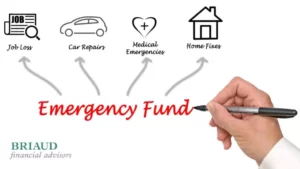What would happen if you experienced a medical issue and had to go without a paycheck for 90 days? How would you survive financially? Would you have to rely on credit cards, a home equity line of credit, or some other kind of loan? Do you have an emergency fund that will allow you to navigate these stormy times?
What is an emergency fund?
An emergency fund is a “safety net” of money you’ve set aside to be used only for unexpected emergencies. Keep in mind that things like vacations, weddings, new gadgets, birthday gifts, and Christmas presents or impulse buys aren’t emergencies. Those things can all be specifically planned or budgeted for. Only significant unforeseen financial events, such as sudden job losses, car accidents, injuries, or hospital stays, constitute a financial emergency.

If you think about it, your money isn’t all the same. In fact, it has many purposes. Much of what you earn is used to pay for ongoing expenses to support your lifestyle today and at least a portion of it should be working for your future. You may also have other specific goals you want your money to accomplish for you, such as funding charitable gifts, future vacations, or education. Having a healthy emergency fund is essential because it allows the rest of your money to continue working for you as intended. Without that sum of money set aside specifically for unexpected financial obligations, you end up siphoning cash from your other goals.
Why you need an emergency fund?
One thing you can always plan on is that unplanned things will happen. So, what do you do when a major financial emergency pops up? Data shows that most people don’t have sufficient savings to cover unexpected large expenses.
Consider, for example, a university professor whom we will call Paula. As part of her benefits program, she has a long-term disability policy with a 90-day elimination provision (the policy will not pay until 90 days have elapsed). Paula develops a serious, vision-threatening eye infection. She never imagined so much pain could come from such a small part of her body nor had she ever taken so many medications to combat any infection. Further, she has temporarily lost vision in her eye, making it impossible to teach and keep up with her other duties.
Her doctor is not sure how long it will take to clear the infection, so she applies for a disability leave. She is surprised to learn that her benefits will not be paid until her 90-day elimination period has ended. Undoubtedly, it was in the policy declaration, but she, like most, did not read the details. Thankfully, she has an emergency fund with 6 months’ worth of living expenses to cover her costs until her disability benefits are paid.
For too many others, an emergency such as this would mean taking on massive credit card or other debt, causing that emergency to cost much more over time. A recent survey showed 40 percent of Americans could not handle a $400 emergency, let alone 3 months of not receiving any income, which would amount to thousands of dollars. A fully funded emergency fund can help you avoid or at least minimize the setback an emergency can have on your finances.
The unexpected loss of a job is another example of a situation where an emergency fund can prove invaluable as it gives you time to search for a suitable replacement.
Some troubling statistics
According to data collected by The Federal Reserve, the median American “transaction account” balance (which includes checking, savings, and money market accounts) was $4,500. Clearly, we Americans aren’t saving enough. In fact, the data showed that only roughly 55% of Americans are saving anything at all! Employers are becoming increasingly aware of the daunting challenge faced by many of their employees to accumulate sufficient assets for an emergency fund and, as this article suggests, are introducing incentives to help them.
How much should I have in an emergency fund?
The typical rule of thumb is that your emergency fund should be able to cover at least 3 to 6 months of essential monthly expenses if you were to find yourself without any income. One of the reasons for this standard recommendation is that elimination periods (as experienced by Paula above) are most commonly 90 days. Sometimes, they can be 180 days or even longer. Depending on the stability and regularity of your current income, you can decide on what amount is best for you.
For example, if your income fluctuates, or if one person in a marriage or partnership has a major medical condition, you may want to maintain 6 months or more of expenses in an emergency fund. College professors and administrators tend to have more stable incomes and may be fine with a smaller emergency fund. The important thing here is to determine what your essential monthly living expenses are and set your emergency fund target accordingly.
Where should I keep my emergency fund?
A good emergency fund has two basic but important features. First, it should be set aside in an account that is separate from your regular checking or savings. And second, it should be liquid and easily accessible. There are many options for savings accounts these days, but it may be as simple as opening a separate savings, money market, or checking account at your bank. If you’re tempted to “borrow” from your emergency fund, you may consider keeping it at a separate bank or institution so it’s not as visible to you. A high-yield savings or money market account would be a good option.
How do I get started?
If you already have a sizeable savings, you may want to use part of it to create or start a separate emergency fund. If you’re not there yet, it’s wise to allocate a portion of your monthly budget toward your emergency fund until it’s fully funded. You’ll likely find that with a healthy emergency fund, financial surprises will be less stressful and impactful to your pocketbook. The peace of mind an emergency fund brings is well worth the effort.
If you have questions about starting your emergency fund, feel free to contact us.

